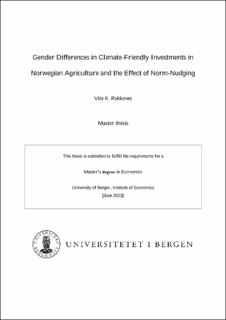Gender Differences in Climate-Friendly Investments in Norwegian Agriculture and the Effect of Norm-Nudging
Master thesis
Permanent lenke
https://hdl.handle.net/11250/3072553Utgivelsesdato
2023-06-02Metadata
Vis full innførselSamlinger
- Master theses [118]
Sammendrag
The Norwegian Farmers Union and The Norwegian Farmers and Smallholder Union have signed an intentional agreement with the Norwegian government to reduce GHG emissions from the sector with 5 million tons of CO2-equivalents by 2030. Zahl-Thanem and Stræte (2022) find that the adaptation rate for some of the recommended climate-friendly practices is low. My research question asks whether there are gender differences in climate-friendly investments in Norwegian agriculture, and whether a norm nudge can affect the stated willingness to invest in climate-friendly investments. 923 Norwegian livestock farmers responded to my survey, which contained, one risk preference elicitation task, one time preference task, and I exposed a randomly selected treatment group to the norm-inducing nudge. I run pairwise correlations between gender, investment patterns, and background characteristics to map the gender differences. I find a significant gender difference in association with climate-friendly investments. One of the main explanatory variables could be risk preferences. The difference in risk preferences appears to explain some of the differences in net income and agricultural area. I also find an association between gender and presence bias. However, this result should be interpreted cautiously as a high cognitive load may have affected the results. The linear regression analysis concludes no treatment effect of the norm nudge, which is why I cannot give any definite policy recommendations. However, there seems to be structural differences between female and male-lead farms. Future research could investigate the effect of increased knowledge and capital for female lead farms.
